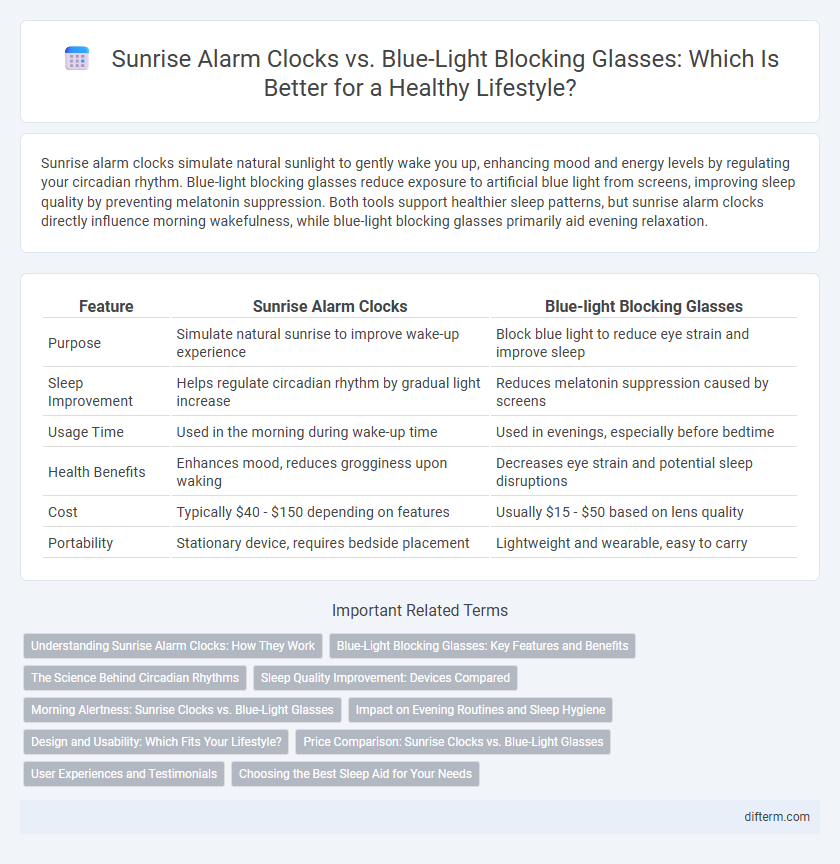Sunrise alarm clocks simulate natural sunlight to gently wake you up, enhancing mood and energy levels by regulating your circadian rhythm. Blue-light blocking glasses reduce exposure to artificial blue light from screens, improving sleep quality by preventing melatonin suppression. Both tools support healthier sleep patterns, but sunrise alarm clocks directly influence morning wakefulness, while blue-light blocking glasses primarily aid evening relaxation.
Table of Comparison
| Feature | Sunrise Alarm Clocks | Blue-light Blocking Glasses |
|---|---|---|
| Purpose | Simulate natural sunrise to improve wake-up experience | Block blue light to reduce eye strain and improve sleep |
| Sleep Improvement | Helps regulate circadian rhythm by gradual light increase | Reduces melatonin suppression caused by screens |
| Usage Time | Used in the morning during wake-up time | Used in evenings, especially before bedtime |
| Health Benefits | Enhances mood, reduces grogginess upon waking | Decreases eye strain and potential sleep disruptions |
| Cost | Typically $40 - $150 depending on features | Usually $15 - $50 based on lens quality |
| Portability | Stationary device, requires bedside placement | Lightweight and wearable, easy to carry |
Understanding Sunrise Alarm Clocks: How They Work
Sunrise alarm clocks simulate natural sunlight by gradually increasing light intensity to gently awaken the body, aligning with the circadian rhythm. These devices use carefully calibrated LED lights that mimic dawn, promoting melatonin suppression and cortisol release for a more natural wake-up process. Unlike blue-light blocking glasses designed to reduce screen exposure before sleep, sunrise alarm clocks actively enhance morning alertness through controlled light therapy.
Blue-Light Blocking Glasses: Key Features and Benefits
Blue-light blocking glasses feature specialized lenses that filter out harmful high-energy blue light emitted by digital screens, reducing eye strain and improving sleep quality. These glasses help regulate circadian rhythms by minimizing exposure to blue light that can suppress melatonin production, essential for restful sleep. Wearing blue-light blocking glasses during evening screen time supports better focus, reduces headaches, and promotes overall eye health in today's screen-dominated lifestyle.
The Science Behind Circadian Rhythms
Sunrise alarm clocks simulate natural light to gradually increase brightness, aligning with the body's circadian rhythm and promoting a smoother wake-up process by reducing melatonin suppression. Blue-light blocking glasses filter high-energy blue wavelengths, minimizing interference with the suprachiasmatic nucleus in the brain that regulates the sleep-wake cycle. Both methods support circadian rhythm regulation but operate through different mechanisms: light exposure modulation versus blue light filtration, impacting melatonin production and sleep quality.
Sleep Quality Improvement: Devices Compared
Sunrise alarm clocks simulate natural sunlight to gently wake the body, aligning with circadian rhythms and promoting better sleep quality. Blue-light blocking glasses filter harmful blue wavelengths from screens, reducing melatonin suppression and enhancing nighttime sleep onset. Comparing both, sunrise alarm clocks primarily improve wake-up routines, while blue-light blocking glasses effectively support falling asleep and maintaining deeper rest.
Morning Alertness: Sunrise Clocks vs. Blue-Light Glasses
Sunrise alarm clocks simulate natural dawn with gradual light increases, effectively triggering the body's circadian rhythm to enhance morning alertness. Blue-light blocking glasses reduce exposure to artificial blue light in the evening, helping to improve sleep quality but offering less immediate impact on wakefulness. For direct morning alertness, sunrise alarm clocks provide a more targeted and naturalistic approach compared to blue-light blocking glasses.
Impact on Evening Routines and Sleep Hygiene
Sunrise alarm clocks simulate natural dawn light, gradually increasing brightness to gently wake users and regulate circadian rhythms, improving sleep quality and morning alertness. Blue-light blocking glasses filter out harmful blue wavelengths from screens, reducing melatonin suppression and minimizing sleep disruptions caused by evening device use. Incorporating either tool promotes healthier sleep hygiene by aligning evening routines with the body's natural biological clock and reducing exposure to artificial light that impairs restorative rest.
Design and Usability: Which Fits Your Lifestyle?
Sunrise alarm clocks feature sleek, minimalist designs with gradually increasing light intensity, mimicking natural dawn to ease waking. Blue-light blocking glasses offer a portable, stylish solution for reducing eye strain and improving sleep quality by filtering harmful screens' blue light. Choosing between these depends on your routine: sunrise clocks suit those who wake at home needing gentle light, while glasses benefit individuals frequently exposed to screens during evening hours.
Price Comparison: Sunrise Clocks vs. Blue-Light Glasses
Sunrise alarm clocks typically range from $30 to $150, offering gradual light simulation to ease waking and improve circadian rhythm. Blue-light blocking glasses vary between $15 and $80, providing a budget-friendly option to reduce eye strain and improve sleep quality by filtering harmful blue light from screens. While sunrise clocks combine technology and natural light benefits at a higher price point, blue-light glasses offer a cost-effective and portable solution for digital eye protection.
User Experiences and Testimonials
Users of sunrise alarm clocks report improved sleep quality and a more natural waking process, with many noting increased energy levels and reduced morning grogginess. Testimonials for blue-light blocking glasses highlight decreased eye strain and better sleep patterns, especially for those exposed to screens late into the evening. Both lifestyle tools receive positive feedback for enhancing overall well-being, yet user preferences often depend on individual routines and sensitivity to light.
Choosing the Best Sleep Aid for Your Needs
Sunrise alarm clocks simulate natural sunlight to gently wake you, aligning with circadian rhythms and promoting a more refreshed morning. Blue-light blocking glasses reduce exposure to harmful blue wavelengths from screens, enhancing melatonin production and improving sleep quality. Choosing the best sleep aid depends on your specific lifestyle; opt for a sunrise alarm clock if waking naturally is your goal, or blue-light blocking glasses for reducing screen-related sleep disturbances.
Sunrise alarm clocks vs Blue-light blocking glasses Infographic

 difterm.com
difterm.com